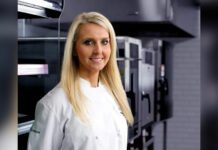A decade ago, Janine Windsor identified a glaring hole in the foodservice industry and set out to do something about it.
“There weren’t any organizations addressing the environmental impact [of restaurants],” says Windsor. “I remember when I worked as a bartender, scooping out handfuls of plastic straws at the end of the night. It just struck me how much waste was created every day, in just one restaurant, then thinking about it across the city, province and country and so on.”
In 2009, she launched the non-profit company, Leaders in Environmentally Accountable Foodservice (LEAF). The company’s mandate was simple — reduce the environmental impact of the foodservice industry.
“We want to build awareness of a wider scale and work with individual businesses to help them look at how they perform environmentally and where they can improve,” says Windsor.
By 2010, LEAF had its first client. The River Café in Calgary, owned and operated by Sal Howell, was the first restaurant to adopt LEAF standards and, according to Howell, the process was an awakening for a restaurant that already considered itself green.
“It was eye opening,” says Howell. “We had an idea of what to do, though none of us were trained or studied sustainability. We were just trying to make good decisions, whether sourcing from producers in our area or reducing plastics. But then Janine and LEAF came along and started documenting what we were doing, giving it a language. That first audit report was an incredible tool to keep digging deeper into what we were doing. Essentially, they gave us a whole list of low-hanging fruit, but things that may not have seemed obvious to us.”
The River Café was a pilot project of sorts, one to get LEAF on the right track, and the company is now working with more than 100 restaurants and businesses to make them more sustainable. Much of the LEAF’s growth can be attributed to the fight against climate change and rise of the eco-friendly movement.
“The global awareness of what we’re doing to our planet has grown. Climate change is a hot topic right now and is getting a lot of publicity, so we have individuals, as well as businesses, looking introspectively and asking what they can do to help,” says Windsor.
This planet-first mindset wasn’t always top-of-mind in the restaurant business — a huge challenge for Windsor’s fledgling company — as most operators were unaware they could be environmentally friendly without hurting the bottom line.
“Just building awareness of the issues was a challenge 10 years ago. There were people in the industry who recognized the role they played as a restaurant owner, but [overall], we had to do a lot of educating,” says Windsor. “People often thought, anytime you’re doing anything sustainable or ‘green’ it was going to cost a lot of money. We don’t have nearly as many of those conversations today as people now understand the business side of being sustainable.”
Though LEAF has grown, there are challenges associated with running a volunteer-driven non-profit organization.
“Lack of resources was and continues to be the biggest challenge. We’re volunteer run, so growth is based on social media, word of mouth and other organic ways,” Windsor explains.
Although LEAF is able to draw resources from a number of sources and it charges a small membership fee, for Windsor, it isn’t about the money.
“We charge a small fee for members who come on board, but we don’t want it to be a barrier. We want to be an inclusive program for anyone to join. The fees we charge go towards the admin side of things,” says Windsor.
This leads her to heavily lean on companies she’s already partnered with to promote the benefits of being LEAF certified. There are three primary benefits to LEAF certification. Beyond the obvious environmental impact, there are less intuitive benefits Windsor has spent years trying to promote — marketing and revenue.
Windsor says becoming LEAF certified is an instant boost to your company’s marketing efforts. In an era of championing the fight against climate change, any company backed and certified by LEAF has a good chance of receiving positive press and boosting its popularity.
The cost-saving aspect of LEAF, Windsor explains, comes from reducing waste and energy consumption — restaurants aren’t throwing as much away and aren’t using as much to begin with.
The process of becoming a LEAF-certified company is a rigorous one; the company in question is given a lengthy audit by a LEAF-accredited consultant and must score at least 80 out of 100. Companies are graded on 10 key areas of sustainability: energy use; food purchasing and menu items; supplies; building and location; furnishing and decorative items; chemicals; waste and recycling; employees; policy and innovation; and water use.
Once the audit is complete, LEAF assigns a level (one to three) — unless you own a small café or food truck, in which case it’s a pass/fail certification — three being the highest and most difficult level to attain.
Only six Canadian restaurants have obtained level-three certification, including Howell’s River Café, and she encourages more companies to get on board with LEAF.
“It’s easy to adopt LEAF, it’s just a matter of prioritizing new habits. It doesn’t happen overnight, but it’s one step after another,” says Howell.
Caffé Beano was another of LEAF’s early adopters. Owner Margie Gibb knows how arduous the process can be for companies looking to be certified under the LEAF umbrella, but also how rewarding it is when you see the light at the end of the tunnel.
“To be certified by LEAF, you really have to jump through some hoops. I was audited every year for quite a number of years,” says Gibb. “But, what really stuck with me was how I could improve on what I was already doing. Working with my suppliers, making better choices about what I’m buying. LEAF helped me up my game in every way.”
Though the task may seem daunting, Windsor hopes businesses aren’t scared away.
“Some people feel they can’t come to us until they are performing really well already. I always hear ‘can you just tell us what to do, we aren’t ready yet, or we aren’t good enough yet.’ But that’s not the point of the program. We’re there to walk you through it,” says Windsor.
LEAF is also addressing sustainability at the supplier level with its Approved-Supplier Program designed to connect restaurant operators with suppliers who offer products and services eligible for points within the LEAF criteria. This also allows suppliers to use the LEAF seal on products to help their consumers identify eco-friendly products.
Looking forward, the organization is planning to expand both its resources as well as its outreach, with the U.S. and Slovenia currently on its radar. In addition to spreading its roots outside of Canada, LEAF is in the process of creating its own online sustainability program. The program hopes to give anyone in the foodservice industry, anywhere in the world, an entry-level knowledge of sustainable practices, says Windsor.


















